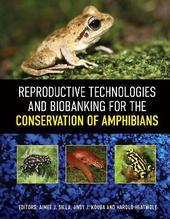
|
Reproductive Technologies and Biobanking for the Conservation of Amphibians
Hardback
Main Details
Description
The first comprehensive sourcebook for the application of reproductive technologies and biobanking as tools for amphibian conservation, exploring an extensive range of topics that will act as a platform for the continued advancement of reproductive technologies as tools for amphibian conservation. How to decelerate loss of global biodiversity is one of the greatest challenges of our generation. Reproductive technologies have enormous potential to assist the recovery of species by enhancing reproductive output, facilitating genetic management, and supporting reintroduction of threatened species. Of particular value are cryopreservation technologies coupled with the establishment of global gene banks to conserve, in perpetuity, the remaining extant genetic diversity of threatened amphibians. Reproductive Technologies and Biobanking for the Conservation of Amphibians brings together leading experts in the field to provide a comprehensive overview of current best practices, summarise technological advancements, and present a framework for facilitating the integration of reproductive technologies and biobanking into conservation breeding programs for threatened amphibians. It is an invaluable reference for the next generation of conservation practitioners: captive breeding facilities, researchers, and policy-makers involved with biodiversity conservation.
Author Biography
Andy J. Kouba is the Wildlife, Fisheries and Aquaculture Department Head at Mississippi State University, Executive Director of the Center for Human-Wildlife Interactions, and Co-Director of the National Amphibian Genome Bank. Aimee J. Silla is an Associate Research Fellow at the University of Wollongong and co-head of the Evolution and Assisted Reproduction Laboratory. Her integrative research advancing reproductive technologies is promoting new directions for threatened species recovery. Harold Heatwole has four doctorates and holds Professorships at North Carolina State University and University of New England. He researches herpetology, biogeography, polar ecosystems, vegetation dynamics, as well as ants, tardigrades, and seabirds. Harold Heatwole was also a co-editor of Volume 11, Part 6 of the Amphibian Biology series, Status of Conservation and Decline of Amphibians: Australia, New Zealand, and Pacific Islands (CSIRO Publishing, 2018).
Reviews"Helpful charts, tables and a section of colour plates complement the text, unpacking some of the more technical aspects of amphibian reproductive technologies and processes. Across Australia, many researchers and organisations are dedicated to progressing amphibian conservation, and this book will be an invaluable resource for the next generation of conservation practitioners whether involved with captive breeding facilities, research or conservation policy development." * Wildlife Health Australia *
|